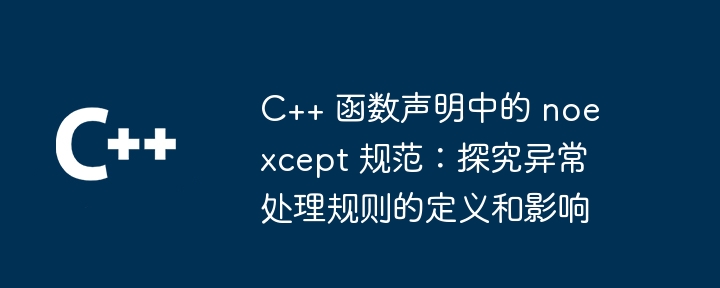Home >Backend Development >C++ >The noexcept specification in C++ function declarations: exploring the definition and impact of exception handling rules
The noexcept specification in C++ function declarations: exploring the definition and impact of exception handling rules
- PHPzOriginal
- 2024-05-03 11:51:01522browse
noexcept specification is a function declaration keyword that declares that a function will not throw exceptions, thus affecting: Optimization: The compiler can perform more optimizations. Performance: Checking noexcept at runtime is faster than checking exception types. Error handling: Programmers can better understand function behavior and handle errors accordingly.

Noexcept specification in C function declarations: Definition and impact
Noexcept specification
noexcept Specification is a keyword used in function declarations to declare to the compiler that the function will not throw any exceptions. It defines function behavior as follows:
noexcept (expression)
where expression is a Boolean expression. If the expression evaluates to true, the function is considered not to throw any exception. Otherwise, the function may throw an exception.
Impact of the noexcept specification
noexcept The specification has an impact on:
- ##Optimization: If a function is declared noexcept
, the compiler can perform additional optimizations because it knows the function will not throw an exception. - Performance: At runtime, checking the noexcept
declaration is faster than checking the exception type. - Error handling: noexcept
Specifications can help programmers better understand the behavior of functions and handle errors accordingly.
Practical case
Consider the following function:int divide(int a, int b) {
// 检查除数是否为 0
if (b == 0) {
throw std::runtime_error("除数为 0");
}
return a / b;
}This function may throw a std::runtime_error Exception, this exception will be thrown when the divisor is 0. It can be declared as noexcept like this:
noexcept int divide(int a, int b) {
// 检查除数是否为 0
if (b == 0) {
throw std::runtime_error("除数为 0");
}
return a / b;
}This way the compiler will know that the function will not throw any exceptions. The above is the detailed content of The noexcept specification in C++ function declarations: exploring the definition and impact of exception handling rules. For more information, please follow other related articles on the PHP Chinese website!

